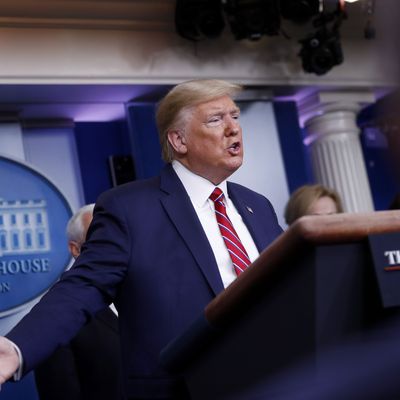
President Trump’s reluctance to use the Defense Production Act has been one of the most enduring mysteries of the coronavirus epidemic. The Defense Production Act is a 1950 law allowing the federal government to redirect vital industry for use in a crisis (primarily a war, but an epidemic would also do). Hospitals are desperately short of ventilators and respirators, and governors, doctors, and public-health officials have begged Trump to invoke the act to direct emergency production before hospital staff gets infected and patients begin dying.
Trump’s diffidence is puzzling, given his normal tendency to push presidential authority to, or well past, its constitutional limits. This is a president who claimed national-security powers to slap tariffs on steel from Canada and Mexico, and to build a border fence.
The New York Times resolves the mystery. Trump has refused to invoke the act because big business doesn’t want him to. “The U.S. Chamber of Commerce and the heads of major corporations have lobbied the administration against using the act,” the Times reports. “They say the move could prove counterproductive, imposing red tape on companies precisely when they need flexibility to deal with closed borders and shuttered factories.” Trump, Lawrence Kudlow, and Jared Kushner all reportedly found these arguments persuasive.
Of course, persuading that troika does not necessarily require a solid factual basis. Kudlow is a fanatical adherent of supply-side economics whose career of wrongness has been sustained by a willingness to advance the narrow interests of the superrich. Kushner is a dilettante heir to his father’s shady construction empire. Trump is … also that, but less intelligent than Kushner.
Trump has touted the voluntary efforts of businesses to crank out emergency supplies. But Trump appears to be getting his rosy information from the firms themselves. Production is not happening fast enough, or at a high enough level, to ensure hospitals will be protected. The Times reports that Hanes, Fruit of the Loom, and other companies are producing respirator masks, the underwear masks “will be made of a three-ply underwear fabric, and do not provide the level of protection given by the N95 masks that health care workers need for intubation and other procedures.”
That isn’t the fault of the underwear-makers, who are dealing with the materials they have and trying to help. It does suggest that the administration’s policy of corporate voluntarism is being driven by the needs of business owners, not the public health.






























